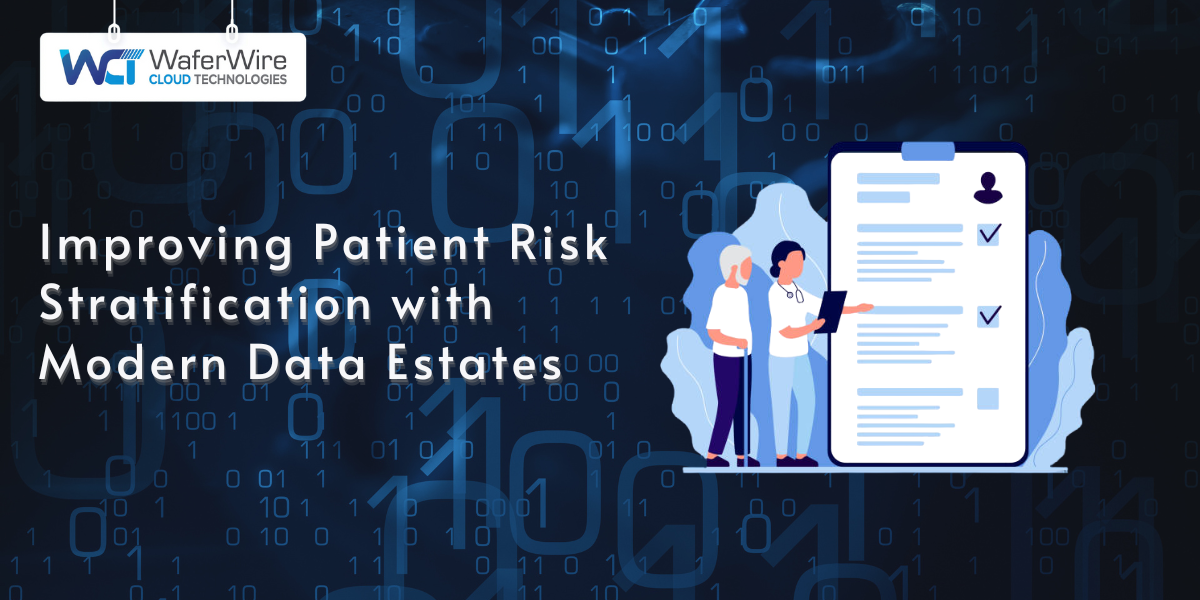
Top 4 Open Source Data Lineage Tracking Tools
Mitra P
2025-04-07
Talk to our cloud experts
Subject tags
Data lineage refers to tracing and visualizing the flow of data throughout its lifecycle—from its origin to its transformation and eventual storage. Data lineage tracking tools are essential in modern data management. They help organizations understand how data flows through various systems, identify data quality issues, and ensure compliance with regulatory standards.
Data lineage is a critical part of data governance. It enables businesses to understand, monitor, and maintain the data flow in their organization. Data lineage tools are key in visualizing, tracking, and governing data across different stages and systems, helping organizations ensure data quality, security, and compliance.
This article explores today's top open-source data lineage tracking tools, discussing their features, benefits, and how they can enhance your organization’s data governance efforts.
Importance of Data Lineage
Data lineage tracking provides transparency in data systems by showing data flow through various processes. It plays a crucial role in several areas:
- Tracking Data Origin, Transformation, and Movement: Understanding where data originates, how it’s processed, and where it’s stored is essential for troubleshooting and ensuring data quality.
- Maintaining Transparency and Enforcing Data Governance: Transparency in data management helps organizations adhere to governance policies and ensures that data is handled properly at all stages.
- Ensuring Data Quality: Data lineage tools help ensure data quality throughout its lifecycle by identifying errors or inconsistencies in the data flow.
Evaluating Open Source Data Lineage Tools
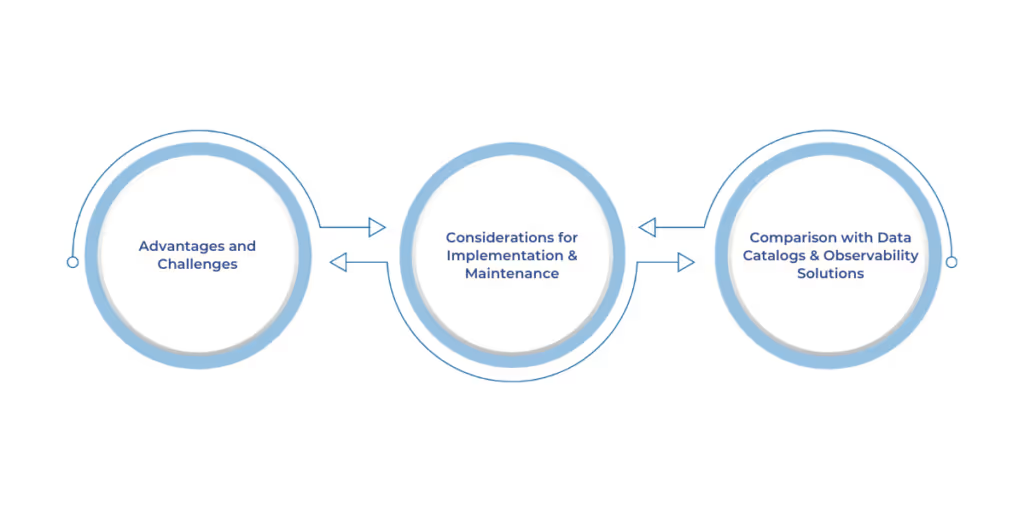
Open-source data lineage tools provide organizations with flexibility, cost-effectiveness, and the ability to customize their data management systems. When evaluating open-source data lineage tracking tools, several key factors should be considered:
- Advantages and Challenges: Open-source tools can be highly flexible and customizable but may require more technical expertise to set up and maintain.
- Considerations for Implementation and Maintenance: Open-source tools may involve complex implementation processes and require ongoing maintenance for optimal performance.
- Comparison with Data Catalogs and Observability Solutions: While data lineage tools focus on data flow, data catalogs, and observability tools offer complementary functionalities such as data discovery, monitoring, and analytics.
Pro Tip: Prioritize Integration
Ensure the tool integrates seamlessly with your existing data systems to avoid compatibility issues and streamline platform management.
Top Open Source Data Lineage Tools
Data lineage tools are essential for organizations to track, visualize, and manage data flow across complex systems. As the amount of data being processed and stored grows, ensuring visibility and understanding of data movement becomes crucial. Open-source data lineage tools offer cost-effective andcustomizablee solutions for businesses of all sizes.
These tools help monitor data transformations, identify data quality issues, and ensure compliance with governance standards. This section explores some of the leading open-source data lineage tools, highlighting their features, strengths, and best-use cases.
1. OpenMetadata
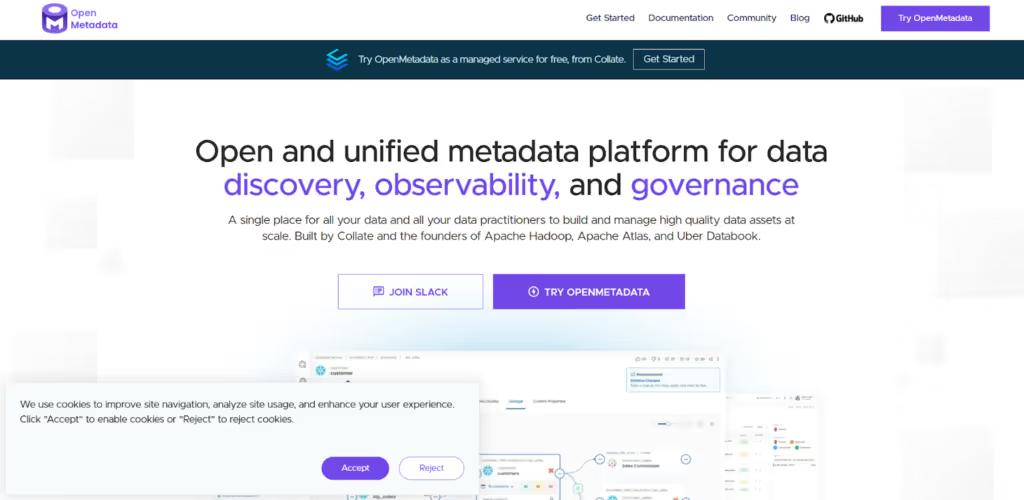
OpenMetadata is an open-source data lineage tracking tool that seamlessly integrates with multiple data sources. It gives organizations a detailed view of how data flows across their systems. The tool offers various features, including customizable APIs and robust lineage visualization, making it an excellent choice for large organizations with complex data systems.
Key Features:
- Integration with multiple data sources
- Customizable APIs for data lineage visualization
- Detailed visualisation for end-to-end data flow
Best For:
- Large organizations with complex data systems
- Teams seeking a customizable and scalable solution for data governance
2. OpenLineage

OpenLineage, in combination with Marquez, provides real-time data lineage tracking and visualization. It allows users to track and manage data as it moves across systems. It’s particularly suited for organizations that require immediate insights into data flows, ensuring transparency in fast-paced data environments.
Key Features:
- Real-time lineage tracking for data transformations
- API integration with various data systems
- Visualization capabilities for end-to-end data flow
Best For:
- Real-time data tracking and transformation
- Organisations with dynamic and fast-evolving data systems
3. Egeria
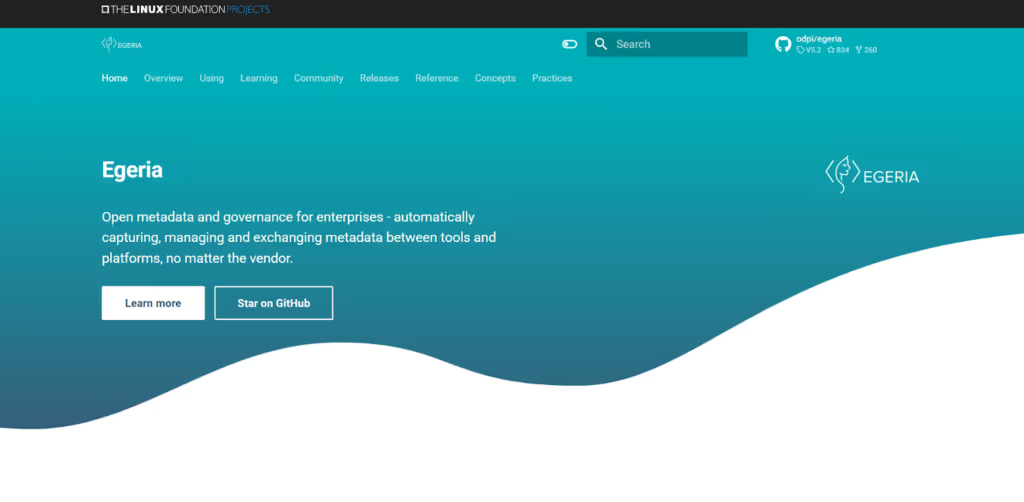
Egeria is an open-source metadata exchange platform that facilitates integration with governance systems. It provides comprehensive metadata management and lineage tracking features, making it an ideal choice for organizations prioritizing data governance and metadata compliance.
Key Features:
- Open-source metadata exchange platform
- Integration with data governance systems
- Lineage tracking and metadata management
Best For:
- Data governance and metadata management
- Organisations focused on metadata and compliance tracking
4. Apache Atlas
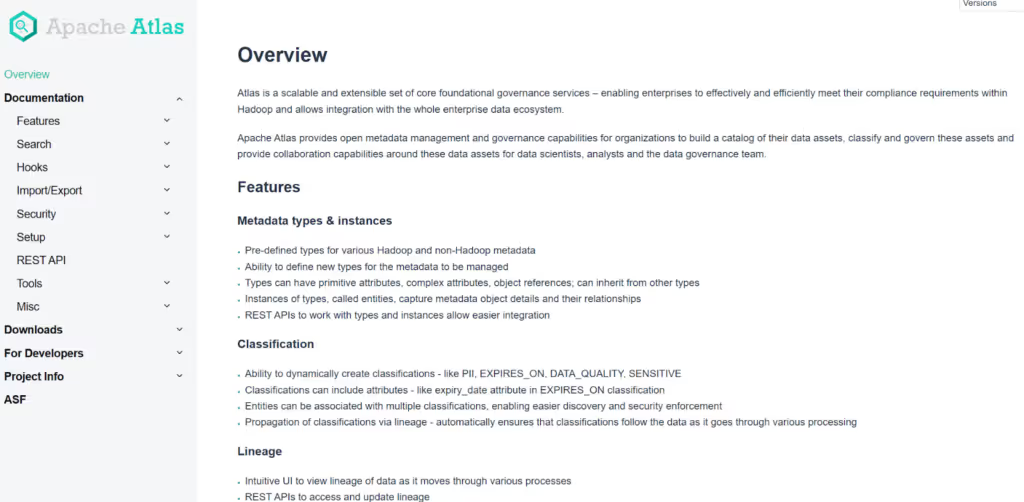
Apache Atlas is a powerful metadata management and lineage tracking tool suited for big data environments, especially those using the Hadoop ecosystem. Its ability to provide real-time lineage visualization and deep integration with Hadoop technologies make it a go-to tool for enterprises in this space.
Key Features:
- Metadata management and lineage tracking capabilities
- Integration with the Hadoop ecosystem
- Real-time lineage visualization
Best For:
- Hadoop-based systems and big data environments
- Enterprises seeking deep integration with big data technologies
Notable Mentions and Emerging Tools
While the aforementioned tools are some of the leading open-source data lineage tracking tools, several emerging tools are worth noting. These tools offer unique capabilities and are quickly gaining traction in the industry.
1. Token

Token focuses on cloud data warehouses and lakes, tracking data lineage as it moves across cloud environments. With powerful visualization capabilities, Tokern is an excellent choice for organizations leveraging cloud-native architectures.
2. Pachyderm
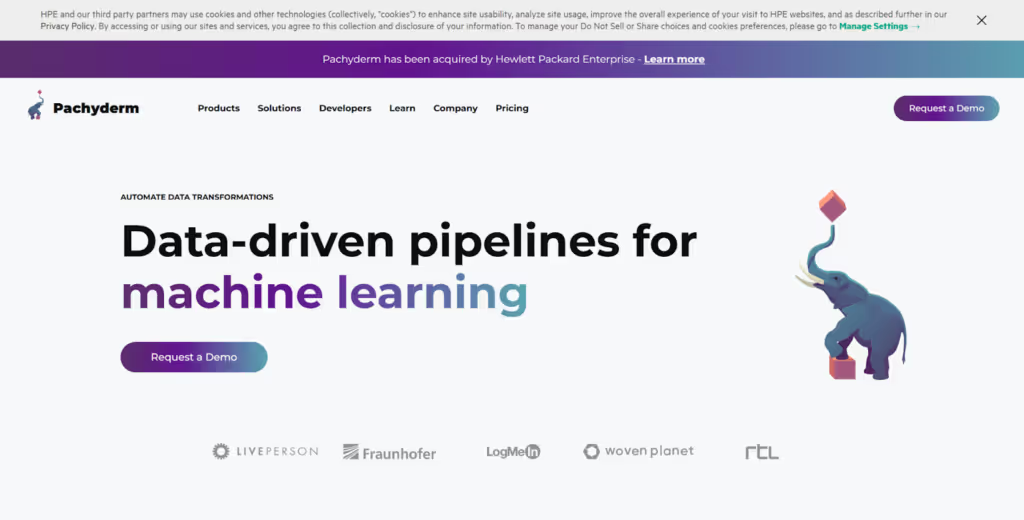
Pachyderm offers versioned data lineage and supports machine learning pipeline tracking. It provides end-to-end data lineage, making it ideal for industries that rely heavily on machine-learning models.
3. TrueDat
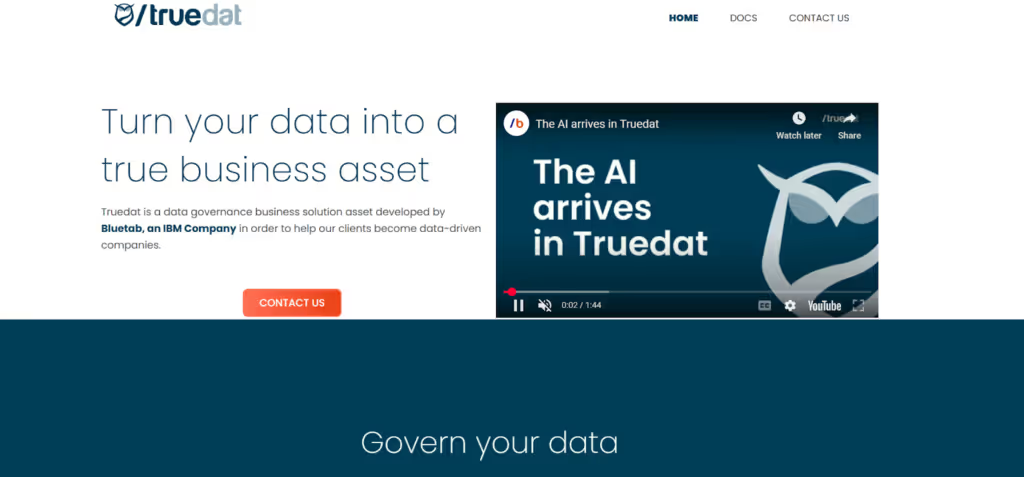
TrueDat is a comprehensive data governance platform that integrates data lineage tracking with other data management features. It’s an excellent tool for organizations that want to manage data quality and lineage in a single platform.
4. DataHub
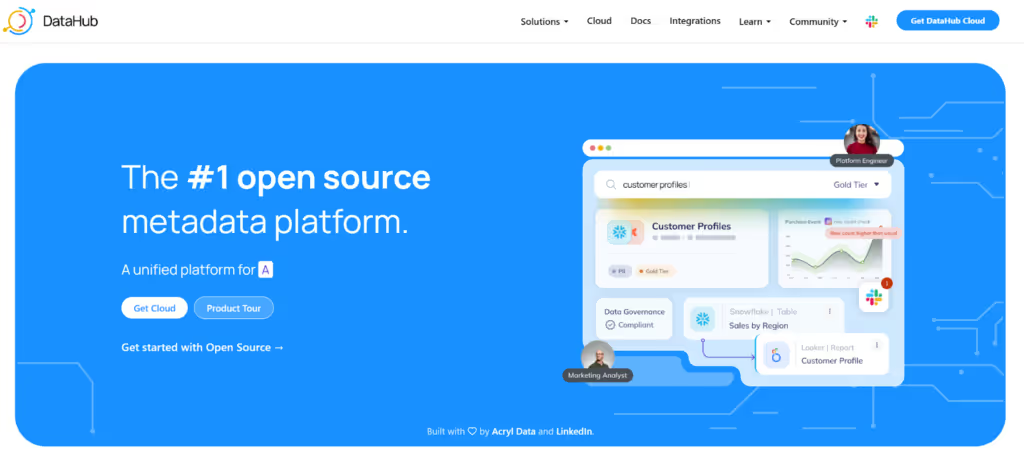
DataHub is an evolving tool that combines data lineage tracking with metadata management. It offers future development plans for deeper lineage integration and provides organizations with a solid foundation for managing their data governance needs.
Considerations for Choosing a Data Lineage Tool
When choosing a data lineage tracking tool, several factors should be carefully considered to ensure the tool aligns with your organization’s data architecture and governance needs. Below is a table summarising the key factors to keep in mind:
ConsiderationKey PointsIntegration CapabilitiesEnsure the tool can integrate with existing data systems (e.g., data lakes, cloud platforms).Feature SetEvaluate the tool’s ability to effectively track, discover, and govern data. Look for features like real-time tracking and visualization.Support for Data GovernanceEnsure the tool supports data governance frameworks to maintain transparency, security, and compliance.ScalabilityEnsure the tool can scale with your data's growing volume and complexity.CustomizationConsider whether the tool allows customization to fit your organization’s specific needs.
When choosing the right data lineage tool, it is essential to consider these factors carefully. Ensure your selected tool aligns with your existing architecture and long-term data governance goals.
Benefits of Using Data Lineage Tools
Data lineage tracking tools offer several critical advantages for modern data management strategies. Some of the most notable benefits include:
- Improved Data Governance: These tools help maintain transparency and accountability by tracking and documenting data flows.
- Enhanced Data Quality: Data lineage tools allow organizations to identify issues and inconsistencies in data flows, ensuring high-quality data throughout the system.
- Regulatory Compliance: These tools ensure that organizations adhere to industry standards and regulations such as GDPR, HIPAA, and others by providing clear visibility into data movement and transformations.
- Efficient Data Troubleshooting: With detailed lineage tracking, organizations can quickly pinpoint the source of data issues and resolve them more effectively.
The Role of Data Lineage in Data Security
Understanding data lineage is crucial for governance, compliance, and data security. Tracking the movement of sensitive data can help organizations identify potential vulnerabilities or unauthorized access points. Proactively identifying and securing sensitive data ensures better protection against breaches, theft, or accidental exposure.
Benefits of Real-Time Data Lineage Tracking
Real-time data lineage tracking offers several advantages over traditional, periodic tracking systems. It provides immediate insights into how data flows through systems, making it easier to spot and address issues in real-time. Some of the key benefits of real-time tracking include:
- Immediate Threat Detection: Quickly spot anomalies or security threats in the data flow.
- Continuous Data Quality Monitoring: Ensure Tata remains accurate and up-to-date throughout its lifecycle.
- Faster Response Times: Enable quicker reactions to data breaches or system failures, minimizing damage.
Integration of Data Lineage Tools with Modern Data Architectures
As organizations increasingly adopt cloud-native architectures, integrating data lineage tools with modern data systems is becoming critical. Cloud-native architectures such as microservices, serverless computing, and containerized applications require tools that can handle complex and distributed data flows.
Some best practices for integrating data lineage tools into modern systems include:
- Utilizing APIs for Seamless Integration: Choose data lineage tools that offer robust API support for integration with modern data systems.
- Ensuring Compatibility with Hybrid Environments: The tool can function across cloud and on-premises systems.
- Continuous Monitoring: Implement continuous monitoring and updates to ensure that lineage tracking remains accurate as systems evolve.
Challenges in Implementing Data Lineage Tools
While data lineage tools offer numerous benefits, there are several challenges organizations may face when implementing these tools:
- Data Complexity: The sheer volume and variety of data in modern organizations can make it difficult to track lineage accurately.
- Tool Integration: Integrating data lineage tracking tools with existing infrastructure can be time-consuming and resource-intensive.
- Data Quality: Ensuring the completeness and accuracy of lineage data is essential for effective governance.
However, these challenges can be overcome with the right planning, tools, and strategies. Organizations can successfully integrate data lineage tools into their architecture by understanding the complexities and implementing best practices.
Pro Tip: Regular Updates and Maintenance
Continuously update and maintain your data lineage tool to keep it accurate and compatible with evolving technologies and workflows.
The Future of Data Lineage Tools: Trends and Innovations
The data lineage landscape is evolving rapidly. Emerging trends and innovations in data lineage tools are shaping the future of data governance. Key trends include:
- AI-Driven Lineage Mapping: AI and machine learning are increasingly integrated into data lineage tools to automate data flow mapping and identify anomalies.
- Integration with Data Observability Tools: Data lineage tools are becoming more integrated with observability platforms, providing deeper insights into data systems and improving proactive incident management.
- Enhanced Cloud-Native Capabilities: As more organizations move to the cloud, lineage tools are better suited to handle cloud-native and hybrid environments.
Conclusion
Data lineage has become a vital aspect of modern data governance. Open-source tools such as OpenMetadata and OpenLineage allow organizations to track, analyze, and manage data flows across systems, ensuring data quality, compliance, and security. By utilizing these tools, businesses can improve operational efficiency, enhance decision-making, and comply with ever-evolving regulations.
Choosing the right tool is critical for ensuring your data governance strategy aligns with your organization’s goals. By assessing your needs and considering factors such as integration capabilities, scalability, and feature sets, you can select a data lineage tracking tool that supports your data infrastructure and enables long-term success.
If you're ready to optimize your data governance strategy, WaferWire can help. Our expertise in implementing data lineage solutions can streamline your processes, improve transparency, and protect your valuable data assets.
Reach out to WaferWire today and enhance your data management capabilities for a more secure and efficient future.
Subscribe to Our Newsletter
Get instant updates in your email without missing any news
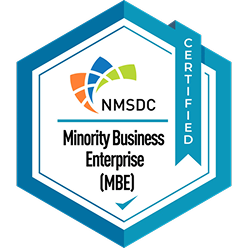
Copyright © 2025 WaferWire Cloud Technologies




.png)








